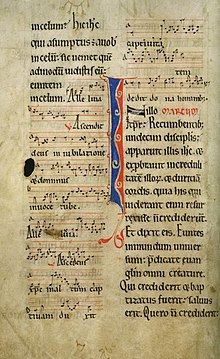Alleluia
Halleluja is the German transcription of the Hebrew הַלְּלוּיָהּ ( hallelu-Jáh ), a liturgical song of joy in the Judeo-Christian tradition and a call to praise God. It is made up of the imperative plural praise from hillel (Hebrew for "praise, glorify, exclaim") and Jah , the short form of the divine name JHWH . Literal translation: Praise Jah!
"JAH" - A poetic shorthand for Jehovah, the name of God Most High. --Ex 15: 1, 2. This abbreviated form corresponds to the first half of the Hebrew Tetragrammaton יהוה (YHWH), i.e. H. the letters jōdh (י) and heʼ (ה), the tenth and fifth letters of the Hebrew alphabet, respectively.
The Latin form Alleluia (German: Alleluja ) goes back to the Greek transcription "ἁλληλουϊά". There only the diacritical mark Spiritus asper ἁ was used because the Greek alphabet does not have an "h".
Mentions
The exclamation can be found 23 times in the Psalms of the Old Testament (104.35; 105.45; 106.1.48; 111.1; 112.1; 113.1.9; 115.18; 116.19; 117.2; 135,1.21; 146,1.10; 147,1.20; 148,1.14; 149,1.9; 150,1.6). Psalms 113 to 118 traditionally form the hallel , the name is based on the opening words of these psalms. Halelu-Jáh is found four more times in the New Testament in Revelation (19: 1-6).
Translations
Use "Alleluja"
- the translation by Joseph Franz von Allioli , 1937;
- the translation by Konstantin Rösch , edited by Bott, 1967.
Use “Hallelujah”
- the revised Elberfeld translation ;
- the standard translation , 1980;
- the Good News Bible , 1997;
- Martin Luther's translation , revised version from 1984 and 2017;
- the translation by Hermann Menge , 1951;
- the New Life Bible , 2006;
- the " Schlachter Bible ", 1951;
- the “ Zurich Bible ”, 2007;
- the translation Hope for All , 1996;
- the New Evangelistic Translation , 2010.
Use "Praise Jah"
- Franz Delitzsch , Commentary on the Psalter, 1860;
- the New World Translation , 1989.
Use “Lobet Jah”
- Caesar von Lengerke , The Five Books of Psalms, 1847;
- Heinrich Ewald , The poetic books of the old covenant, 1835
“Praise Jehovah (h)” is used in
- Johann Gottfried Herder , On the Spirit of Ebrean Poetry, 1825;
- Wilhelm Martin Leberecht de Wette , The Holy Scriptures of the Old and New Testaments, 1839
"Boast Jah" is used
- the text bible
liturgy
In the rite of the Roman Catholic Church , during Holy Mass outside of Lent the sung Hallelujah is part of the call to the Gospel with which the community venerates the Christ present in the Gospel .
In the Lent is the Roman Rite the Alleluia is not needed. In the Easter season is in the Holy Mass at the entrance - and Kommunionvers Hallelujah added, during the octave of Easter follows the Entlassungsruf a double Hallelujah .
In the Liturgy of the Hours one sings or speaks a Hallelujah in some places during Easter. In Easter week, as in Mass, the call for dismissal is followed by a double hallelujah . During Lent it is completely eliminated.
In the Byzantine rite of the Eastern Churches , it is understood not as a cry of jubilation but as a cry of homage and is always sung regardless of the festive season.
In the Evangelical Lutheran service, the Hallelujah (usually without a verse ) is the community's answer to the Epistle . It is followed by the weekly song , followed by the gospel.
The Hallelujah is used extensively in the Charismatic Churches and Pentecostal churches in worship services, particularly popular in the United States and Africa . (See also Jehovah ).
Web links
See also
Individual evidence
- ↑ DUDEN Foreign Dictionary, p. 262, Dudenverlag Mannheim 1966.
- ^ Meyers Enzyklopädisches Lexikon, Volume 11, p. 332, Mannheim 1974.
- ↑ See General Introduction to the Roman Missal , 2nd Edition, No. 37–38
- ^ The evangelical worship service: Hallelujah in the course of the worship service
